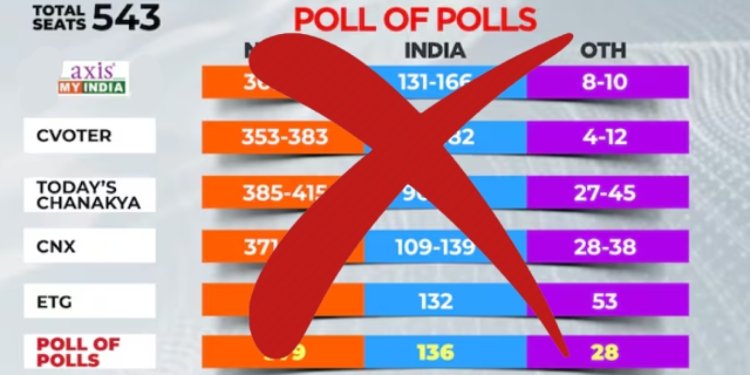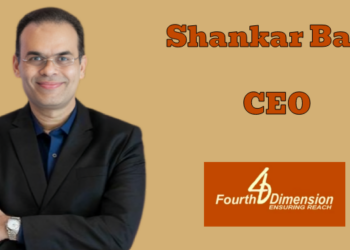The 2024 Indian general election results have brought unexpected changes to the country’s political scene. Despite high expectations, the Bharatiya Janata Party (BJP) did not achieve a majority on its own. The 2024 Indian general election results have revealed a stark deviation from the exit poll predictions conducted by national news channels, which had projected the Bharatiya Janata Party (BJP) to secure over 359 seats. Contrary to these predictions, the BJP’s final seat count settled at 240, falling short of the 272 required for a majority in the Lok Sabha and significantly less than the 302 seats it secured in the 2019 election. As a result, Prime Minister Narendra Modi will now rely on the support of coalition partners to form the government.
At the same time, Congress demonstrated signs of an electoral resurgence after suffering severe defeats in the 2014 and 2019 general elections against the BJP.
While political alignments are being negotiated, significant public criticism has been directed at news channels for their exit poll predictions. Almost all the major news channels, including Republic TV, Times Now, ABP News, and India Today, predicted a clear victory for the BJP, which starkly contrasted with the actual results. These incorrect predictions have led to widespread public disapproval and have questioned the credibility of the agencies that conducted these polls. In another dramatic turn of events, Axis My India Chairman and Managing Director Pradeep Gupta broke down during a television interview after his firm’s exit poll predictions proved to be significantly inaccurate. On June 1, Axis My India had forecasted a landslide victory for the NDA, predicting between 361 and 401 seats, closely aligning with the BJP’s “400 paar” campaign slogan.
The failure of these exit poll predictions to accurately reflect the electorate’s sentiment raises critical questions about the methodologies used by polling agencies and the reliability on such surveys.
Allegations have also surfaced suggesting that inaccurate exit polls were manipulated to influence the stock market. These claims imply that misleading exit poll data could be intentionally disseminated to create market volatility, thus benefiting certain investors who might have prior knowledge or the ability to act swiftly on this misinformation. Prominent social commentator Dhruv Rathee has highlighted these concerns, stating, “The Exit Poll fraud must be investigated. Did they all do this to manipulate the stock market? Or were they threatened by someone to do it?”
Such claims add another layer of complexity, suggesting that the motives behind exit poll predictions might not always be purely informational. The gap between exit poll predictions and actual outcomes has significant implications for the credibility of news media. When these polls are proven wrong, it undermines the trust that viewers place in the media.

Paritosh Joshi, Principal – Provocateur Advisory said, “Credibility of news channels is a larger question, one of the biggest issues that is being raised today is that the only people who succeeded (despite the exit polls results) are the stock market speculators-who actually inflated the index by talking of a possibility of a complete majority of 400 for the BJP. Then with Sensex began to decline, they capitalized on the situation and made massive money at very high prices. Then arise a question on what lies behind it-this cannot be a mere accident.”
An industry watcher, who doesn’t want to be named, said, “The consistent inaccuracies in exit poll predictions are beginning to erode the credibility of news media. Viewers are increasingly sceptical about the reliability of these polls and the news channels that broadcast them.”

“Firstly, news media in India, as it is anywhere in the world is completely biased and consistently frames a narrative that it wants to,” observed Ramesh Narayan, Founder Canco Advertising.
“So today if I ask you which newspaper you read, which TV channel you watch or which digital news media you consume, I can immediately spell out your political ideology and your political leanings. That being the case, credibility is a very strange word to use. It’s all about what you want to believe. And you will continue to merrily consume the news that frames the particular narrative you want to believe in. Welcome to the brave new world where news is just another product. It is shaped to suit your age, taste and beliefs,” Narayan added.
“News is not news anymore. There is no news media in India if you consider the current mainstream media to be representative of the independent media of the nation. Current status is very much in line with what independent web-based medias like The News Minute, News laundry, Dekoder and to an extent The Print had predicted. If not anything, exit polls will significantly reduce the credibility of mainstream news media and pollsters like Axis My India and also pundits/ strategists like Prashant Kishore,” said an industry watcher.
This erosion of trust could have far-reaching implications. In a democracy, the media plays a crucial role in informing the public and shaping public opinion. If the media’s credibility is compromised, it can lead to widespread skepticism and disengagement among the electorate.
Elaborating on what could have gone wrong with the exit polls, an industry watcher said,“The objective of Exit polls is to provide a snapshot of potential election outcomes based on voters’ responses immediately after voting. However, the 2024 elections demonstrated that these tools might not be accurate enough to capture the nation’s true mood.”
He further explained, “There are several factors could explain why exit polls were so inaccurate. The first one being the sampling methods used by polling agencies. Exit polls often rely on relatively small sample sizes, leading to significant margins of error. Additionally, the selection of polling locations may not adequately represent India’s diverse electorate. The complexity of voter behavior, influenced by social media, regional dynamics, and last-minute opinion changes, further complicates the accuracy of exit polls.”
Joshi believes that these issues could have been resolved or avoided by adhering to journalistic due diligence
He expalined, “Now, as far as the news channels are concerned, they have commissioned the research agencies for the exit poll results. The research agencies conducted it through a particular process. With exit polls failing to predict the right numbers, the process will be challenged and there will be questions asked on the credibility of the process followed by the research agencies. The news channels will have a lot of explaining to do there and there is no doubt about it. They can claim that the data is acquired through the research agency but what due diligence did they apply? It is not enough to say that this is what our research agency told us, the question is did they apply journalistic due diligence to cross check the numbers.”
“As journalists, it is their duty to corroborate everything. This issue is not just limited to exit polls and elections, but a broader question on how could they do it without journalistic scepticism. The media houses should have resorted to other ways to corroborate it. The issue is that they published it as God’s own truth. I am reiterating that basic journalistic standards were made redundant. The basic act of challenging and questioning the each piece of information from one source was published without cross checking with any other sources,” he concluded.
The industry watcher added, “To address these challenges, polling agencies and news media must adopt more rigorous methodologies and transparent practices. Improving the accuracy of exit polls requires larger and more representative sample sizes, better training for pollsters, and the use of advanced statistical techniques.”

















